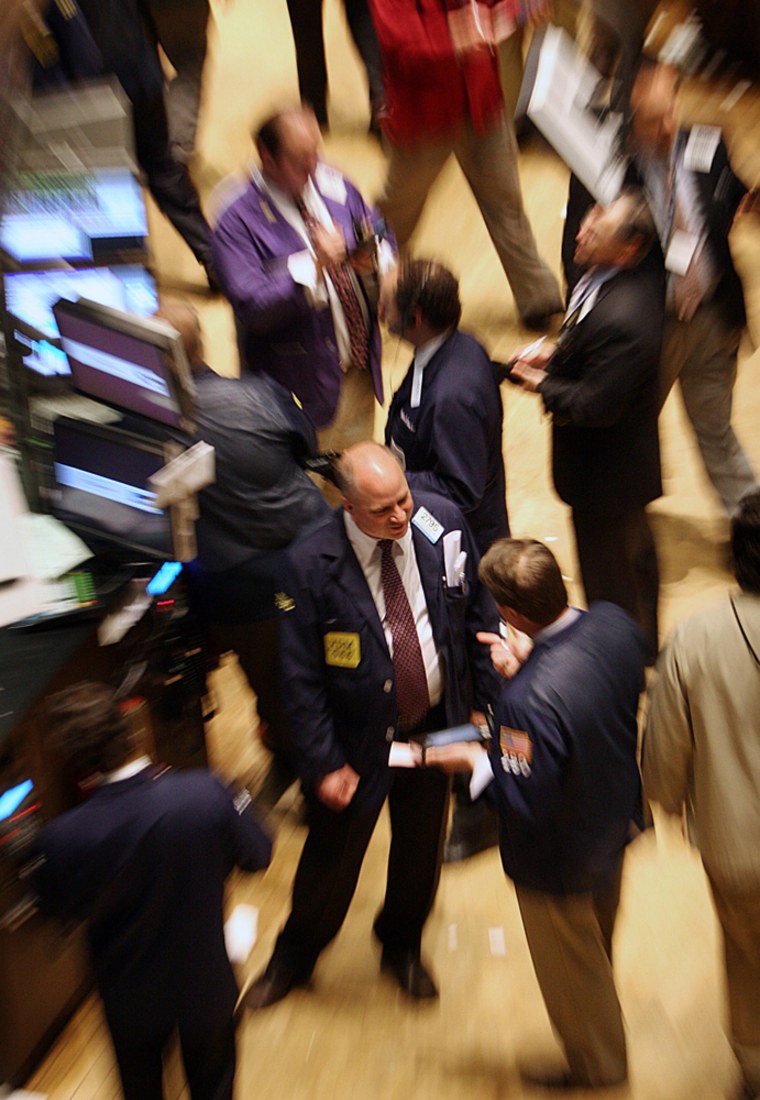Wall Street surged Tuesday, with the market’s main stock indexes chalking up their biggest one-day jump in about a year, as investors welcomed minutes from the Federal Reserve’s most recent policy-setting meeting, which suggested the central bank is nearly done with raising interest rates.
Released mid-afternoon, the Fed’s minutes extended the market’s already sharp gains. Stocks had been rising since the start of trading, as solid corporate earnings overshadowed a surge in crude oil prices to a new record high.
“When it appears as though the governors of the Federal Reserve believe that the end of the rate increases is near, that’s very good news for investors,” said Hugh Johnson, chairman and chief investment officer of Johnson Illington Advisors in Albany, N.Y. “A lack of ambiguity from the Federal Reserve is always a shocker.”
Art Cashin, director of floor operations at UBS PaineWebber, said Tuesday’s strong advance was also due to comments from San Francisco Federal Reserve President Janet Yellen, a voting member of the Fed’s Federal Open Market Committee in 2006, who said that after 15 consecutive rate increases since June 2004, the federal funds rate is close to neutral.
“This is a singular rally,” Cashin told CNBC from the floor of the New York Stock Exchange. “A lot of people are starting to think the Fed is done [with raising interest rates]. The stock market is very happy with the rate outlook, and that’s what it’s all about today.”
Minutes of the Federal Reserve’s closed door meeting on March 27-28 — Ben Bernanke’s first as chairman — were released Tuesday afternoon, providing insight into policymakers’ thinking as they grappled with what might be the appropriate time for the central bank to bring its credit tightening campaign to an end.
“Most members thought that the end of the tightening process was likely to be near,” according to the minutes. And although they saw an imminent end to the central bank’s nearly two-year rate-hike campaign, some raised concerns about the potential dangers of the Fed pushing up rates too high, which could crimp the economy.
All three of the market’s main stock indexes closed Tuesday with their biggest one-day gain since April 21, 2005. The Dow Jones industrial average surged 194.99 points, or 1.76 percent, while the broader Standard & Poor’s 500-stock index rallied 22.32 points, or 1.74 percent. The Nasdaq composite index jumped 44.98 points, or 1.95 percent.
Traders had already gotten some comfort early Tuesday from the Labor Department’s report that “core” wholesale inflation, which excludes volatile energy and food prices, rose just 0.1 percent last month. Overall inflation rose 0.5 percent, the fastest pace in three months, after a 1.4 percent drop in February. However, the core number indicated that the effects of higher oil are not making their way throughout the economy.
Any sign of rising inflation has sent stock prices falling, as fighting inflation has been the Fed’s primary concern. However, while the economy has been expanding, inflation has been under control.
With some reassurance from the Fed, investors are likely to focus more on earnings, which are cascading in this week and next. If company results show they’ve managed to weather higher prices for energy and other commodities, Wall Street could have the incentive to continue a rally started in March but put on hold in recent weeks.
At the same time, Tuesday’s Fed minutes showed policy makers are not giving up their inflation watch.
“Members also recognized that in current circumstances, checking upside risks to inflation was important to sustaining good economic performance,” the minutes stated.
Still, the threat of inflation was evident Tuesday in the continued surge of energy prices. The rise, caused by increasing tension over Iran’s nuclear energy program and worries about disruption to supplies from Nigeria, pushed crude to a record close of $71.35 on the New York Mercantile Exchange.
But stock investors, calmed by past experience, appeared to be looking past the price of crude, analysts said.
“We have seen it before and that’s the key. It’s not a new level and we didn’t really see demand taper off, we didn’t really see economic activity slow down because of it,” said Steven Goldman, chief market strategist, Weeden & Co. in Greenwich, Conn. “A year ago we thought $70 would be the death knell for consumers. It wasn’t.”
Energy stocks rose on oil prices. Shares of Exxon Mobil Corp. rose $1.49, or 2.4 percent, to $63.54. Valero Energy Corp. gained $1.80, or 2.7 percent, to close at $67.45.
Other gainers included Merrill Lynch & Co. Inc., which reported sharply lower first-quarter earnings but still beat analyst estimates. Merrill rose 92 cents, or 1.2 percent, to $79.38.
Johnson & Johnson also rose, adding 48 cents to close at $58.13, after the health products company reported a 17 percent increase in first-quarter profits, just beating estimates.
IBM Corp. rose $1.67, or 2.1 percent, to trade at $83.31 ahead of the company’s announcement of its quarterly results. After the close, IBM said the residual effects of sweeping cost cuts helped first-quarter earnings rise 22 percent and beat analysts’ expectations despite minor revenue growth.
Overseas, Japan’s Nikkei stock average rose 1.4 percent. In Europe, Britain’s FTSE 100 gained 0.2 percent, Germany’s DAX index fell 0.3 percent and France’s CAC-40 declined 0.1 percent.
